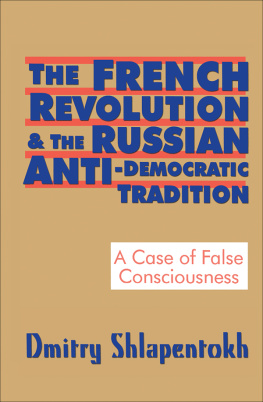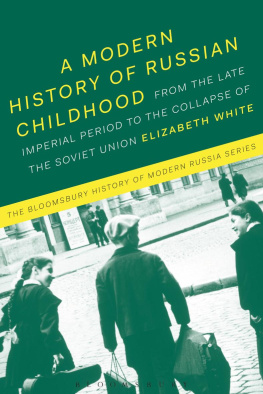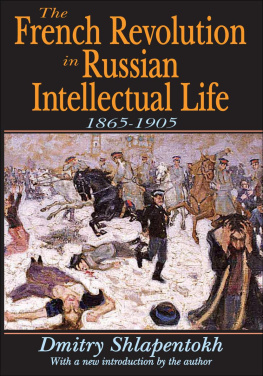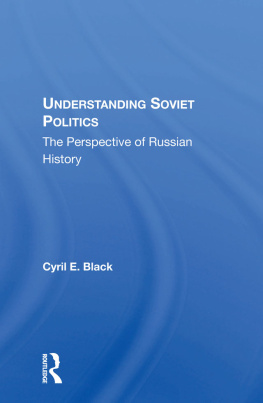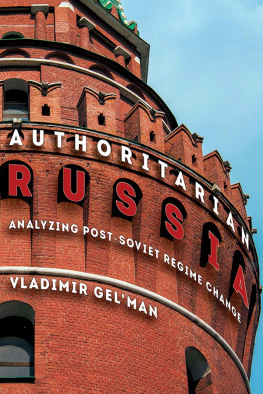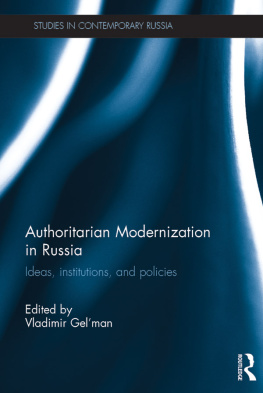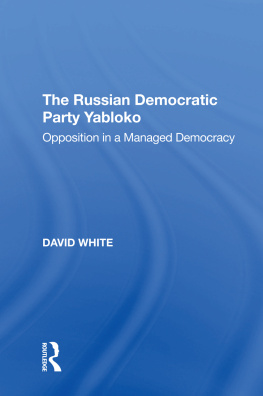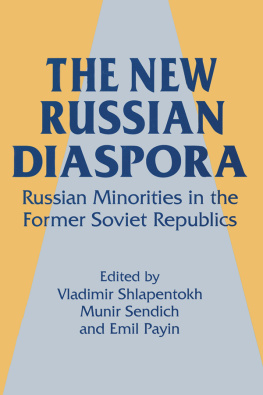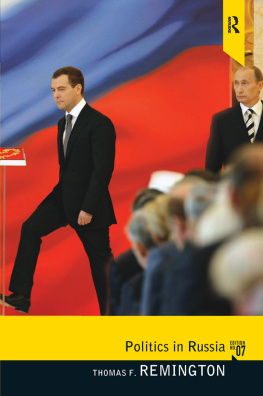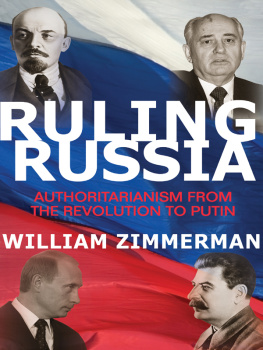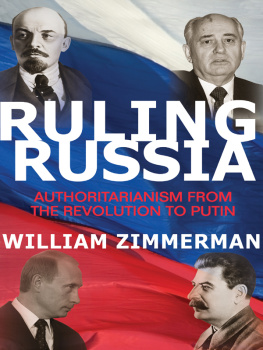First published 1997 by Transaction Publishers
Published 2017 by Routledge
2 Park Square, Milton Park, Abingdon, Oxon, OX14 4RN
711 Third Avenue, New York, NY 10017, USA
Routledge is an imprint of the Taylor & Francis Group, an informa business
Copyright 1997 by Taylor & Francis.
All rights reserved. No part of this book may be reprinted or reproduced or utilised in any form or by any electronic, mechanical, or other means, now known or hereafter invented, including photocopying and recording, or in any information storage or retrieval system, without permission in writing from the publishers.
Notice:
Product or corporate names may be trademarks or registered trademarks, and are used only for identification and explanation without intent to infringe.
Library of Congress Catalog Number: 96-46232
Library of Congress Cataloging-in-Publication Data
Shlapentokh, Dmitry.
The French Revolution and the Russian anti-democratic tradition : a case
of false consciousness / Dmitry Shlapentokh.
p. cm.
Includes bibliographical references and index.
ISBN 1-56000-244-1 (cloth : alk. paper)
1. FranceHistoryRevolution, 1789-1799Foreign public opinion,
Russian. 2. Public opinionRussia. 3. FranceHistoryRevolution,
1789-1799Influence. 4. RussiaHistoryPhilosophy. I. Title.
DC158.8.S476 1997
944.04dc20 96-46232
CIP
ISBN 13: 978-1-56000-244-4 (hbk)
This manuscript went through several stages before it became a book, and many people, organizations, and even cultures should be credited for its development. The original idea for the book was conceived more than twenty years ago when the author was still a student at Moscow State University in what was at the time the USSR. It could be said in hindsight that the major contributor to the work was the cultural milieu of the evil empire. The author, who belongs to what seems to be the last Soviet generation, can testify from personal experience that Brezhnevs reign was not only a time of drunkenness and lovemaking, the major preoccupations most Soviet intellectuals then, but also a time when there was still great respect for culture and knowledge.
The greatness of the Soviet empire, the mighty successor to imperial Russia, was translated by the Soviet mind into intellectual globalism. Indeed, for my generation and those who preceded it, world history was as dear and close to the heart as Russian/Soviet history. Thoughts of the Roman empire and its invincible legions evoked vivid comparisons with the seemingly invincible Red Army and the Soviet empire that stretched from the Pacific to the middle of Europe. Images from ancient Assyria and Egypt were compared to the Soviet economy with its penchant for slave or semi-slave labor. The French Revolution, the subject of this book, was a point of interest for it offered a comparison to the Russian Revolution, and it was also a symbol of the Westmighty, prosperous, democratic, and culturally sophisticated. For Russian intellectuals the French Revolution symbolized more than the horror of the past, it was an outline for the future. It was one of the historical symbols of Russian Westernism, a sort of capitalist version of communism, and its assumption that Western democracy was the bright future of humanity.
All of this intellectual curiousity and genuine love for culture has gone the way of all flesh. The great katastroika engulfed the Soviet regime, and as Russia shrank back to its seventeenth-century size, so did the famous Russian soul. This transformation reflected the end of Russia as a great power and underscored the unconscious feeling that the country had reached a dead end, not a historical crossroads. Today (1996), this dried up Russian soul expresses itself in a narrow pragmatism and cold materialism that exceeds the excesses of the communists rotten West many times over. The monuments of the past stand in Moscow as remnants of a civilization that, like Atlantis, has disappeared. To some degree, my book is also a remnant of the mighty Soviet civilization, a small piece of dried bone or piece of pottery to be trod upon by the new Russians and by tourists.
Of course, all historical artifacts are dry bones scattered on the field of libraries and museums. There is only one path to resurrection: to be read and interpreted. The resurrection in this case is epistemologically subjective and inevitably relativisticin a way intellectual play. The author of this volume is aware that a book on interpretation itself could be the subject of interpretation. And possibly it could be discovered in the dusty basement of some research library and be interpreted by future intellectual historians as a dry bone from the last years of a culture and country that no longer exists, Brezhnevs USSR. This period of Soviet history, especially its cultural history (a term used broadly) still awaits its impartial historians.
Many people and institutions have contributed to the authors intellectual growth and consequently to the final draft of this book. As I stated earlier, I began research on the book while still a student in the USSR, to be precise at Moscow State University. Upon emigration to the United States in 1979, 1 was introduced to Robert M. Slusser, at the time a professor of Russian history at Michigan State University. Professor Slusser treated me kindly, even though at the time I was without language skills, and introduced me to Western historical craft. He also encouraged me to proceed with the study of my subject. I also remember warmly many others at Michigan State who helped me become incorporated into a new life and new thinking, or novoe myshlenie, as the last Soviet leader would later say.
I owe a special debt of gratitude to the University of Chicago, my real alma mater. The University has a strong tradition in Russian studies, and I must give special thanks to the following people. First among these is Professor Jeffrey Brooks. Without his help and encouragement, I would not have made it through the program or been able to write my dissertation which became the final nucleus of this book. Indeed, he struggled mightily with endless drafts, written in an English that was, to put it mildly, far from perfect. The present book is as much his effort as mine. Secondly, I want to thank Professor Richard Hellie, who, like Professor Brooks, has provided me with guidance for my academic career and has set an example of the Protestant work ethic. He was the second reader of my dissertation. I also give thanks to Professor Keith Baker who introduced me to the world of Western historiography of the French Revolution and who was the third reader of my work. I might add that I continue to receive inspiration for my work from my alma mater, and not only from those who have known my work for some time. I recently became acquainted with Francois Furet, and his stimulating conversation has provided me with additional stimulus for my work on this subject.
The greater part of the research and writing on this book was done in my historical motherlandIsrael, where I spent two years, one as a Lady Davis Fellow at Hebrew University. There I had the opportunity to work with an array of specialists in Russian/East European Studies. They include, among many others, Professor Knei Paz and Professor Jonathan Frankel as well as the late Professor Mikhail Agursky. They provided me with a stimulating intellectual environment and helped to germinate many ideas that I later incorporated into this book. The exuberance of the country itself made both the work and living enjoyable.

